Abstract
Both isometric exercise and cold stress have been suggested as alternatives to dynamic exercise for the detection of obstructive coronary artery disease. A non-imaging nuclear probe was used to measure left ventricular ejection fraction and relative left ventricular volumes continuously during both of these stress tests in 24 normal subjects. There was a significant fall in left ventricular ejection fraction within 15 seconds of subjects starting a two minute isometric hand grip test at 50% maximal voluntary contraction, with a mean (SE) maximal fall of 10% (1.8) after 90 seconds. During two minutes immersion of the hand and wrist in iced water left ventricular ejection fraction fell significantly within 30 seconds with a mean maximal fall of 7% (1.7) after one minute. Nine subjects underwent repeat tests under identical conditions approximately two weeks later. The standard error of the change in ejection fraction on two occasions was 5.4% at rest, 7.0% at the peak of isometric exercise, and 4.8% at peak cold stress. These results indicate that the reproducibility of both of these stress tests is acceptable when they are performed under carefully controlled conditions. The resulting changes in ejection fraction are transient, however, and moreover depend upon the choice of stress protocol. The discrepancies between published reports of such studies in coronary artery disease may be mainly due to methodological differences, and neither test is likely to be of sufficient discriminative ability to distinguish between individuals with obstructive coronary artery disease and normal subjects.
Full text
PDF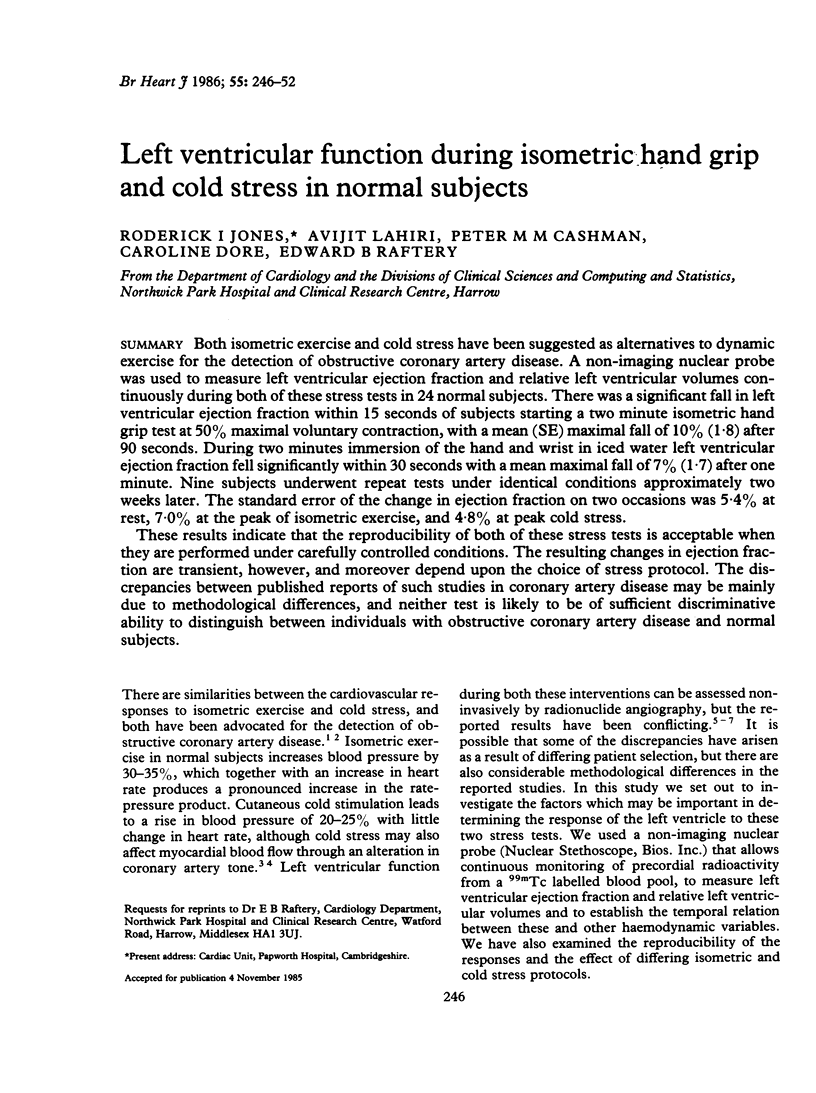
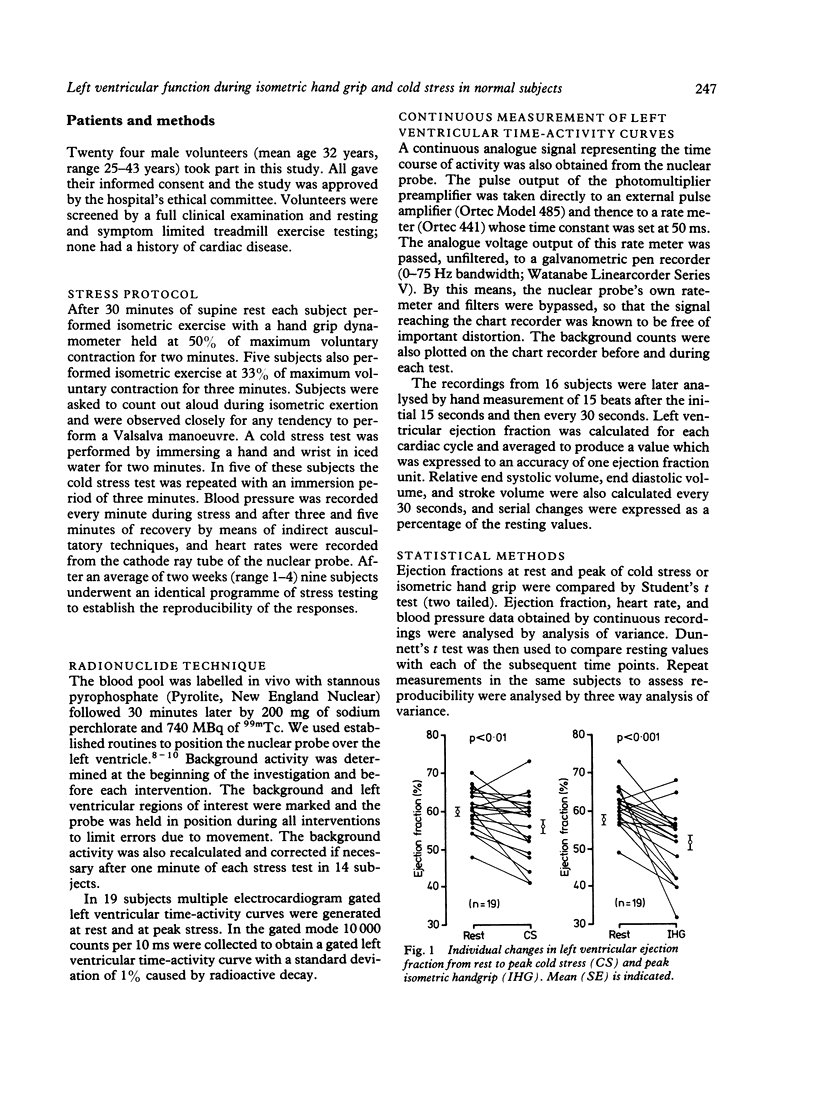
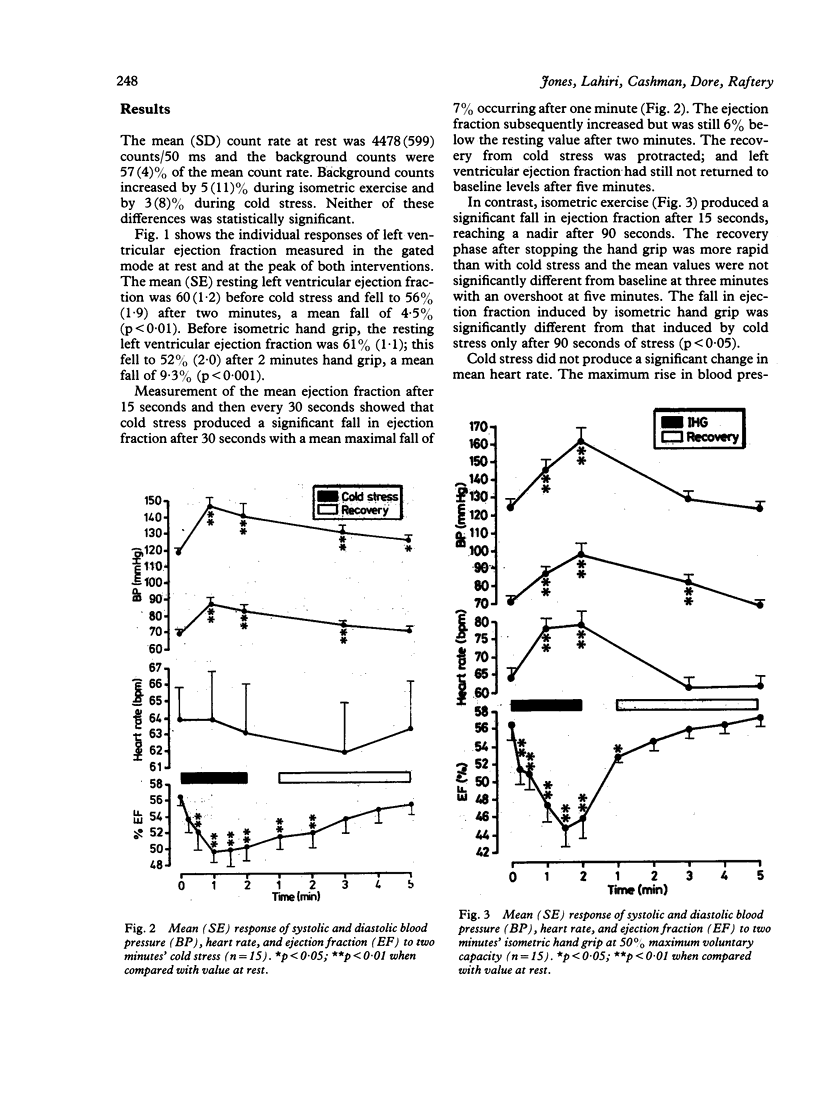
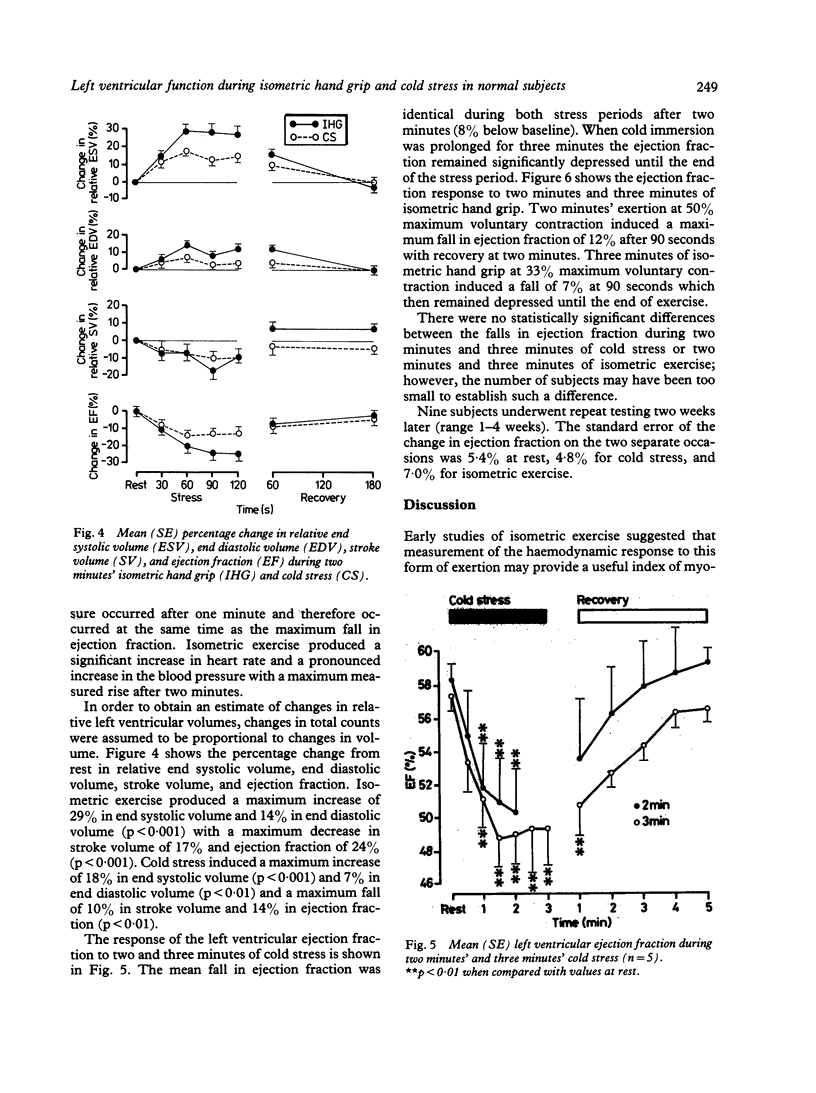
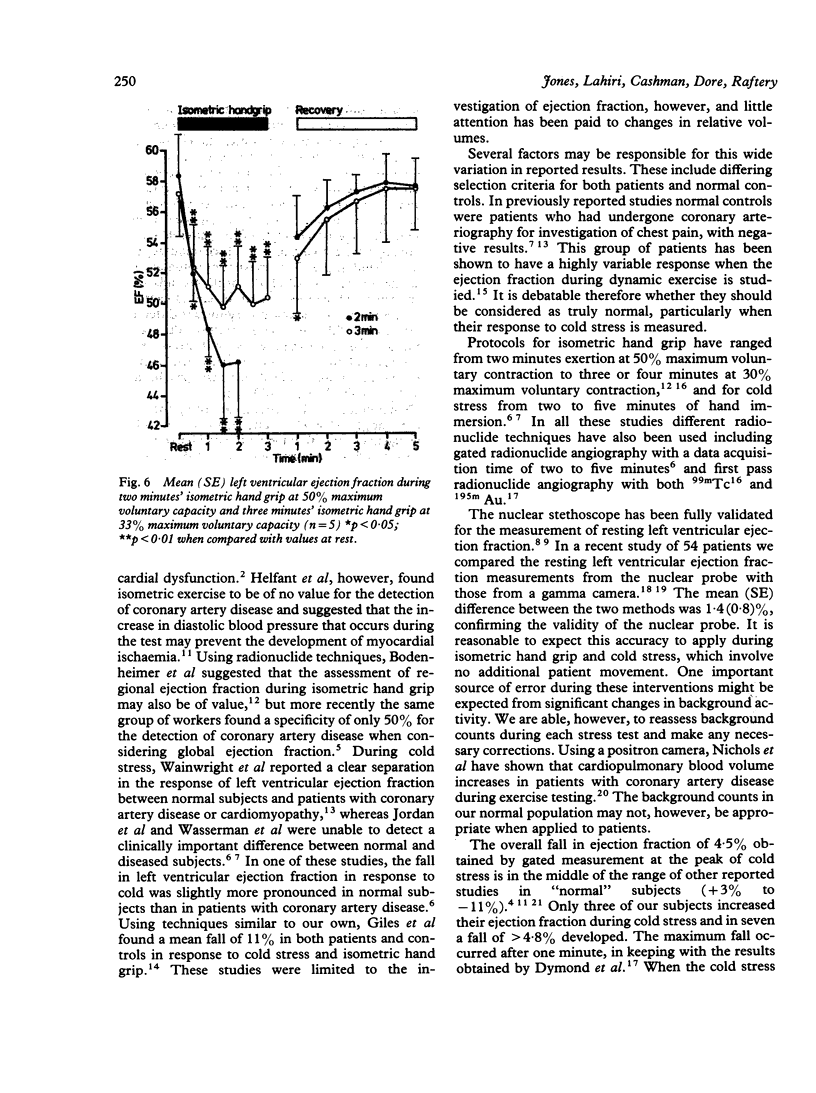
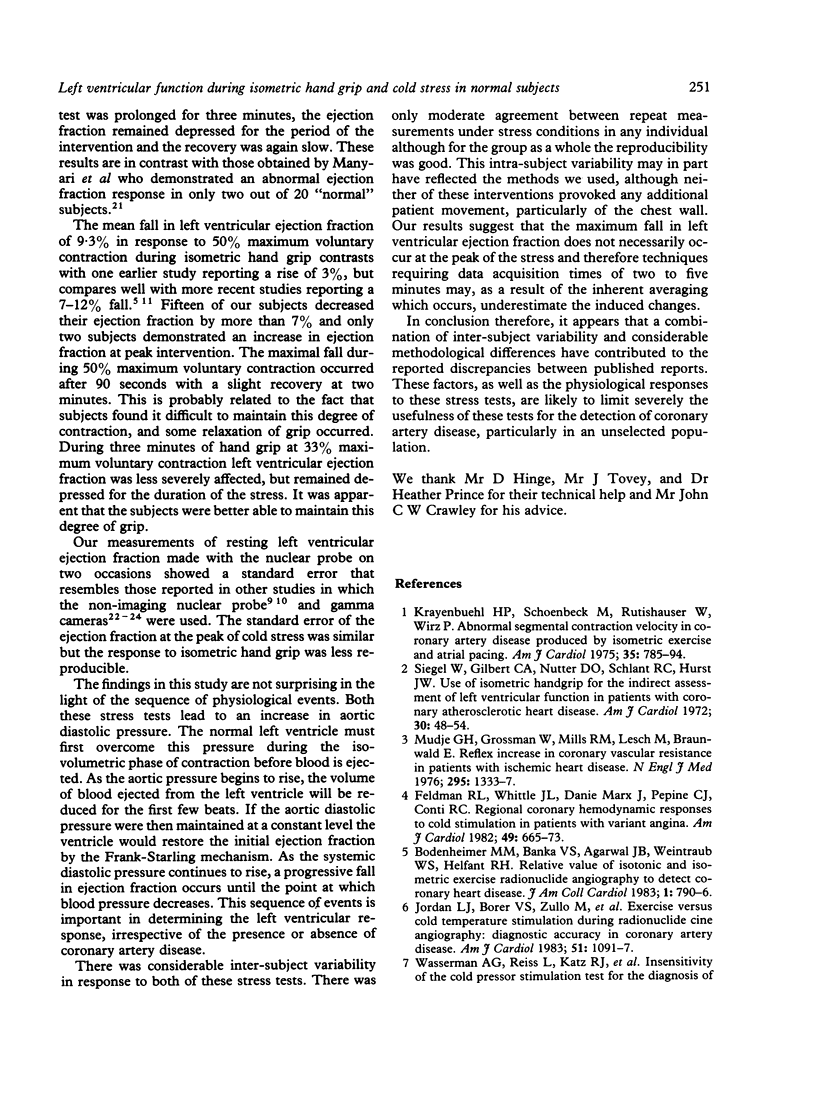
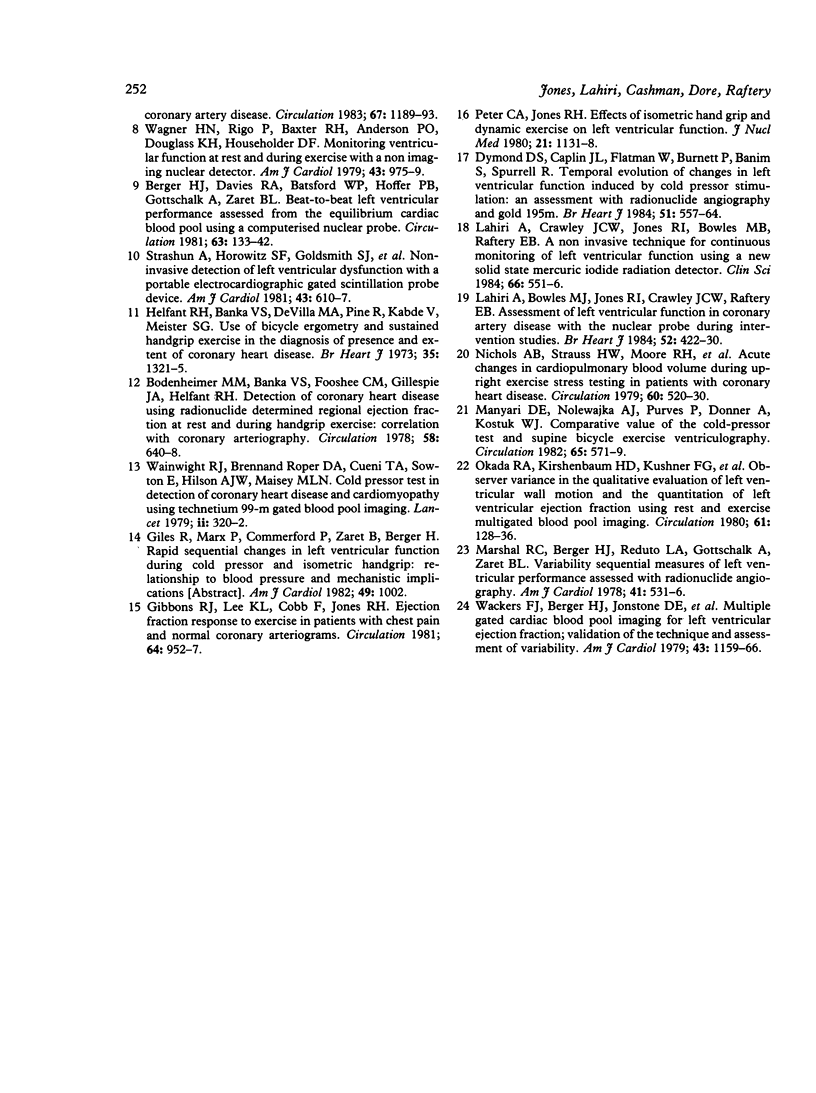
Selected References
These references are in PubMed. This may not be the complete list of references from this article.
- Berger H. J., Davies R. A., Batsford W. P., Hoffer P. B., Gottschalk A., Zaret B. L. Beat-to-beat left ventricular performance assessed from the equilibrium cardiac blood pool using a computerized nuclear probe. Circulation. 1981 Jan;63(1):133–142. doi: 10.1161/01.cir.63.1.133. [DOI] [PubMed] [Google Scholar]
- Bodenheimer M. M., Banka V. S., Agarwal J. B., Weintraub W. S., Helfant R. H. Relative value of isotonic and isometric exercise radionuclide angiography to detect coronary heart disease. J Am Coll Cardiol. 1983 Mar;1(3):790–796. doi: 10.1016/s0735-1097(83)80192-2. [DOI] [PubMed] [Google Scholar]
- Bodenheimer M. M., Banka V. S., Fooshee C. M., Gillespie J. A., Helfant R. H. Detection of coronary heart disease using radionuclide determined regional ejection fraction at rest and during handgrip exercise: correlation with coronary arteriography. Circulation. 1978 Oct;58(4):640–648. doi: 10.1161/01.cir.58.4.640. [DOI] [PubMed] [Google Scholar]
- Dymond D. S., Caplin J. L., Flatman W., Burnett P., Banim S., Spurrell R. Temporal evolution of changes in left ventricular function induced by cold pressor stimulation. An assessment with radionuclide angiography and gold 195m. Br Heart J. 1984 May;51(5):557–564. doi: 10.1136/hrt.51.5.557. [DOI] [PMC free article] [PubMed] [Google Scholar]
- Feldman R. L., Whittle J. L., Marx J. D., Pepine C. J., Conti C. R. Regional coronary hemodynamic responses to cold stimulation in patients without variant angina. Am J Cardiol. 1982 Mar;49(4):665–673. doi: 10.1016/0002-9149(82)91944-0. [DOI] [PubMed] [Google Scholar]
- Gibbons R. J., Lee K. L., Cobb F., Jones R. H. Ejection fraction response to exercise in patients with chest pain and normal coronary arteriograms. Circulation. 1981 Nov;64(5):952–957. doi: 10.1161/01.cir.64.5.952. [DOI] [PubMed] [Google Scholar]
- Helfant R. H., Banka V. S., DeVilla M. A., Pine R., Kabde V., Meister S. G. Use of bicycle ergometry and sustained handgrip exercise in the diagnosis of presence and extent of coronary heart disease. Br Heart J. 1973 Dec;35(12):1321–1325. doi: 10.1136/hrt.35.12.1321. [DOI] [PMC free article] [PubMed] [Google Scholar]
- Jordan L. J., Borer J. S., Zullo M., Hayes D., Kubo S., Moses J. W., Carter J. Exercise versus cold temperature stimulation during radionuclide cineangiography: diagnostic accuracy in coronary artery disease. Am J Cardiol. 1983 Apr;51(7):1091–1097. doi: 10.1016/0002-9149(83)90351-x. [DOI] [PubMed] [Google Scholar]
- Krayenbuehl H. P., Schoenbeck M., Rutishauser W., Wirz P. Abnormal segmental contraction velocity in coronary artery disease produced by isometric exercise and atrial pacing. Am J Cardiol. 1975 Jun;35(6):785–794. doi: 10.1016/0002-9149(75)90113-7. [DOI] [PubMed] [Google Scholar]
- Lahiri A., Bowles M. J., Jones R. I., Crawley J. C., Raftery E. B. Assessment of left ventricular function in coronary artery disease with the nuclear probe during intervention studies. Br Heart J. 1984 Oct;52(4):422–430. doi: 10.1136/hrt.52.4.422. [DOI] [PMC free article] [PubMed] [Google Scholar]
- Lahiri A., Crawley J. C., Jones R. I., Bowles M. J., Raftery E. B. A non-invasive technique for continuous monitoring of left ventricular function using a new solid state mercuric iodide radiation detector. Clin Sci (Lond) 1984 May;66(5):551–556. doi: 10.1042/cs0660551. [DOI] [PubMed] [Google Scholar]
- Manyari D. E., Nolewajka A. J., Purves P., Donner A., Kostuk W. J. Comparative value of the cold-pressor test and supine bicycle exercise to detect subjects with coronary artery disease using radionuclide ventriculography. Circulation. 1982 Mar;65(3):571–579. doi: 10.1161/01.cir.65.3.571. [DOI] [PubMed] [Google Scholar]
- Marshall R. C., Berger H. J., Reduto L. A., Gottschalk A., Zaret B. L. Variability in sequential measures of left ventricular performance assessed with radionuclide angiocardiography. Am J Cardiol. 1978 Mar;41(3):531–536. doi: 10.1016/0002-9149(78)90011-5. [DOI] [PubMed] [Google Scholar]
- Mudge G. H., Jr, Grossman W., Mills R. M., Jr, Lesch M., Braunwald E. Reflex increase in coronary vascular resistance in patients with ischemic heart disease. N Engl J Med. 1976 Dec 9;295(24):1333–1337. doi: 10.1056/NEJM197612092952401. [DOI] [PMC free article] [PubMed] [Google Scholar]
- Nichols A. B., Strauss H. W., Moore R. H., Guiney T. E., Cochavi S., Beller G. A., Pohost G. M. Acute changes in cardiopulmonary blood volume during upright exercise stress testing in patients with coronary heart disease. Circulation. 1979 Sep;60(3):520–530. doi: 10.1161/01.cir.60.3.520. [DOI] [PubMed] [Google Scholar]
- Okada R. D., Kirshenbaum H. D., Kushner F. G., Strauss H. W., Dinsmore R. E., Newell J. B., Boucher C. A., Block P. C., Pohost G. M. Observer variance in the qualitative evaluation of left ventricular wall motion and the quantitation of left ventricular ejection fraction using rest and exercise multigated blood pool imaging. Circulation. 1980 Jan;61(1):128–136. doi: 10.1161/01.cir.61.1.128. [DOI] [PubMed] [Google Scholar]
- Peter C. A., Jones R. H. Effects of isometric handgrip and dynamic exercise on left-ventricular function. J Nucl Med. 1980 Dec;21(12):1131–1138. [PubMed] [Google Scholar]
- Siegel W., Gilbert C. A., Nutter D. O., Schlant R. C., Hurst J. W. Use of isometric handgrip for the indirect assessment of left ventricular function in patients with coronary atherosclerotic heart disease. Am J Cardiol. 1972 Jul 11;30(1):48–54. doi: 10.1016/0002-9149(72)90124-5. [DOI] [PubMed] [Google Scholar]
- Strashun A., Horowitz S. F., Goldsmith S. J., Teichholz L. E., Dicker A., Miceli K., Gorlin R. Noninvasive detection of left ventricular dysfunction with a portable electrocardiographic gated scintillation probe device. Am J Cardiol. 1981 Mar;47(3):610–617. doi: 10.1016/0002-9149(81)90545-2. [DOI] [PubMed] [Google Scholar]
- Wackers F. J., Berger H. J., Johnstone D. E., Goldman L., Reduto L. A., Langou R. A., Gottschalk A., Zaret B. L. Multiple gated cardiac blood pool imaging for left ventricular ejection fraction: validation of the technique and assessment of variability. Am J Cardiol. 1979 Jun;43(6):1159–1166. doi: 10.1016/0002-9149(79)90148-6. [DOI] [PubMed] [Google Scholar]
- Wagner H. N., Jr, Rigo P., Baxter R. H., Alderson P. O., Douglass K. H., Housholder D. F. Monitoring ventricular function at rest and during exercise with a nonimaging nuclear detector. Am J Cardiol. 1979 May;43(5):975–979. doi: 10.1016/0002-9149(79)90362-x. [DOI] [PubMed] [Google Scholar]
- Wainwright R. J., Brennand-Roper D. A., Cueni T. A., Sowton E., Hilson A. J., Maisey M. N. Cold pressor test in detection of coronary heart-disease and cardiomyopathy using technetium-99m gated blood-pool imaging. Lancet. 1979 Aug 18;2(8138):320–323. doi: 10.1016/s0140-6736(79)90341-6. [DOI] [PubMed] [Google Scholar]
- Wasserman A. G., Reiss L., Katz R. J., Leiboff R., Cleary P., Varma V. M., Reba R. C., Ross A. M. Insensitivity of the cold pressor stimulation test for the diagnosis of coronary artery disease. Circulation. 1983 Jun;67(6):1189–1193. doi: 10.1161/01.cir.67.6.1189. [DOI] [PubMed] [Google Scholar]


